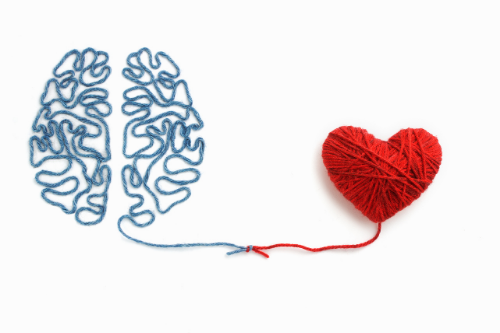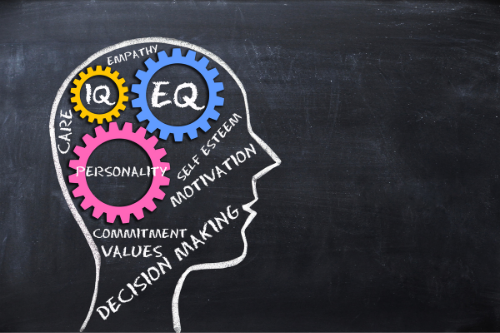Emotional intelligence when working from home is gaining traction as a hiring tool due to research revealing its importance in predicting the success of job candidates. With recruiters and hiring managers beginning to incorporate emotional intelligence assessments into the hiring process, remote jobseekers should take notice. So what does this term actually mean, and why do remote workers need a lot of it?
What Is Emotional Intelligence When Working From Home?

In a nutshell, emotional intelligence (EI), or emotional quotient (EQ), refers to an individual’s ability to discern and handle their emotions. Instead of judging intelligence based on common intelligence quotient (IQ) test measures of reasoning and problem-solving abilities, this type of intelligence is based on the skillful management of your emotions. So, if you comprehend your own emotions, understand the emotions of others, and act appropriately in social settings, you may have a high level of emotional intelligence.
A Brief History of Emotional Intelligence in the Workplace
At one time, an individual’s IQ was considered the determining factor to achieve success in a position. However, research was not backing up that claim. In fact, as a result of their research, Hunter and Hunter estimated that IQ only accounts for about 25% of the variance between individuals who were successful and those that were not. Findings like this led researchers to explore more effective measures of intelligence and predictors of professional success.
The first definitive analysis of emotional intelligence was introduced in 1995 by Daniel Goleman. His book triggered an avalanche of research into the concept’s ability to both predict and support individual success. Since then, researchers have consistently found a strong correlation between emotional intelligence and success. One recent global study of over 75,000 people, found that EQ predicted 55% of overall success, defined as enhanced effectiveness, relationships, wellbeing, and quality of life.
The Importance of Emotional Intelligence When Working from Home

The ability to manage your emotions is important because your emotions determine the quality of your experience and serve to guide your actions. As an example, think of the last time you were really angry at work. How did it feel? Not very good, right? You were probably in a great deal of mental pain and physical distress. Due to your suffering, you may have lashed out verbally or in writing at the object of your anger.
While we all have experiences similar to the one outlined above, it doesn’t have to be that way. Consider what a higher level of emotional intelligence may have brought to that same situation: You would become aware of your anger before it became a problem, you would bring perspective to the situation, determine a constructive way to express your anger, and use it as a way to enhance your decision-making abilities. Not only do you feel better, but so do the objects of your emotions, i.e. your teammates, co-workers, bosses.
Due to the COVID-19 pandemic, 46% of organizations suddenly implemented work-from-home policies. Even as some workers return to the office, up to 68% of businesses plan to implement flexible work arrangements permanently. As working from home becomes the new normal, employers must integrate emotional intelligence strategies into the remote work model on a long term basis.
In normal times, remote workers tend to be happier and more productive than their in-office counterparts. However, remote work can also lead to a variety of mental health problems such as professional isolation and burnout. Added to these are concerns due to COVID-19 such as job security, finances, childcare, and the physical health of yourself and others. Emotional intelligence when working from home is especially important during these challenging times.
4 Domains of Emotional Intelligence
In order to better understand emotional intelligence, comprehending the four distinct domains or categories as identified by Goleman is essential.
1. Self-Awareness
This category refers to your ability to accurately identify your own emotions and the effect they have on both yourself and others. It also refers to your self-esteem and confidence levels.
2. Self-Management
The ability to control your emotions effectively and appropriately is the main message of this category. In addition, it refers to self-motivation and adaptation to stressful situations while maintaining a sense of optimism.
3. Social Awareness
A contrast to self-awareness, this category highlights the importance of recognizing and understanding other people’s emotions. This also refers to your ability to be empathic of other’s feelings.
4. Relationship Management
Using social awareness, this category focuses on your ability to lead, motivate, and support others. Conflict management is another component of this idea.
Do You Have Emotional Intelligence?

Using the framework above, the million dollar question becomes, what is your level of emotional intelligence? How much do you use emotional intelligence when working from home?
To help answer this question, take an emotional intelligence assessment test. In the world of recruiting, a wide variety of methods can measure your emotional intelligence. One way is to ask questions during an interview designed to capture the emotional intelligence illustrated in your responses. For example, a question regarding how you would resolve a conflict.
You may also be asked to take an assessment test. Again, there are a variety of assessment tools available. Some focus on identifying your traits—or self-report testing—which is perhaps most relevant for positions requiring positive behavioral tendencies and stress coping strategies. Decision-makers, problem-solvers, and negotiators may be better identified using assessments that test your actual ability to perform EI tasks. In addition, there are tools that test for both using a variety of questioning techniques.
For the purposes of self-analysis, all three types of assessments are valid. They will improve your understanding of emotional intelligence in general and your own level of emotional intelligence specifically. Below are examples of three assessments tools you can try:
Mixed Ability/Trait Test
Emotional Intelligence Test, Psychology Today
This is probably the most in-depth and comprehensive assessment tool available online with over 145 questions. The format of questions varies from capture self-reporting to skill evaluation. If you spring for the $9.95 report, you get a detailed breakdown on your performance. Results include your strengths, as well as areas in need of improvement.
Ability-Based
Test Your Emotional Intelligence: How well do you read other people?, The Greater Good Science Center, University of California, Berkeley
Your level of social awareness—or the ability to read emotions—is the focus of this free assessment tool. This quiz shows a series of photographs and asks you to identify the emotion on their face. The benefit of this test is that it provides you with instant feedback in the form of the correct answer and tips about how to read that emotion in others.
Trait-Based
How Emotionally Intelligent Are You? Boost Your People Skills, Mind Tools
Designed to assess how you would respond in certain situations, this quick and free tool measures your behavioral tendencies and, therefore, your emotional intelligence. Using your responses, they place you in a low, medium, or high category and provide further descriptions of the skills required and how to hone them.
Tips for Improving Your Emotional Intelligence When Working from Home
One of the most positive aspects of emotional intelligence is that it’s entirely possible to improve your skill level. Using the feedback obtained from your assessments, you can develop a strategy to improve. Below are a few tips and exercises you can undertake to improve your emotional intelligence in the four areas listed above.
Self-Awareness
- Name Your Emotions: To improve your ability to accurately identify and manage your emotions, try naming your emotions as they arise. Studies have shown that you can calm your brain simply by verbally identifying an emotion. Why this occurs has to do with the area of the brain that is producing the emotional experience. Initially, a strong emotion may cause activity in the amygdala, or the part of your brain that also produces the fight or flight response of adrenaline. Once your cortex takes over in the naming of the emotion, you become calmer and more rational in your response.
- Journal Your Emotions: Pay attention and document what happens to your body, your voice, and your mind when you experience different emotions along with when and how long you experience them. Keeping a detailed journal for a period of time will help identify your emotions and what triggers them. In addition, journaling will bring attention to your emotional experiences and the effects they may have on your activities and relationships.
Self-Management
- Develop Strategies to Manage Your Emotions: Once you can accurately identify your emotions as they arise, you can develop and implement strategies to help you react more appropriately and positively to challenging situations. A variety of different mechanisms can help. Options include taking a ‘time-out,’ deep breathing exercises, or reframing the situation to identify any silver linings. Take your top three or four commonly triggered emotions at work and design a strategy to process and release them.
- Gain Perspective on Negative Events: Research has shown that if you change your perspective on a negative situation from a first-person to a third-person perspective, you can lower your negative feelings. This technique involves recalling a situation and then thinking about it as though a different person experienced it. This approach is called self-distancing. It consistently leads to fewer negative emotions, faster recovery, and greater insight about how to leverage the experience for learning and growth.
Social Awareness
- Practice Active Listening: One of the best ways to improve your social awareness is to practice active listening. When you are in social conversations or professional meetings, your focus is mostly on yourself. Even in telephone or video calls, you tend to pay attention to others only to find a spot in the conversation to interject your opinion. Active listening involves looking outside of yourself, being mindful, and paying attention to others. Practice bringing attention to your interactions. When you lose focus, practice returning your attention to the conversation. Rehearse active listening techniques with text-based communications as well.
- Identify the Emotions of Others: Another way to build your social awareness muscles is to practice identifying the emotions of others. Initially, you can use a tool such as the ability-based EI test introduced above. As mentioned, the tool helps train you to notice and interpret the facial aspects that indicate that particular emotion. When you get the hang of it, practice in social and professional situations—both video-based and in-person. This will improve your mindfulness and keep your focus outside of yourself.
Relationship Management
- Bring it All Together: Good relationship management involves combining your self-awareness, self-management, and social awareness skills to make good relationship decisions. Your responses and actions in the moment will determine how successful you are in achieving your communication and relationship goals. Use active listening and emotional awareness. This will help you implement appropriate emotional management strategies and generate empathy for the perspectives of others. By using these skills to guide your responses and actions, you can optimize your ability to influence progress toward your goals.
The number of recruiters using emotional intelligence as a valid predictor of professional success—especially for leadership positions—is only going to increase. Combined with the tangible benefits it brings to your own life means that incorporating emotional intelligence when working from home is essential going forward. Practicing the exercises outlined above will give you a jump on the competition while also improving your relationships and your overall state of mind during challenging times.
Do you have any proven methods to build emotional intelligence when working from home? Connect with Virtual Vocations on Facebook, Twitter, LinkedIn, Instagram, and YouTube to share your advice. We’d love to hear from you!

Join Virtual Vocations
Joining Virtual Vocations grants you access to our hand-picked remote jobs database. Learn how our service works, browse job leads by location and career category, or search hundreds of hand-screened remote jobs to find legitimate work-at-home job leads that match your skills and background. Register for free or contact us for more information on our service guarantee.
Check out our menu of Career Services provided by our team of certified professionals, including resume and career coaching services for remote jobseekers. Resume assessments and writing, LinkedIn profile enhancement, and cover letter writing are available to maximize the success of your remote job applications. Discounts on all services available to subscription members, become one now.
Images via Canva




